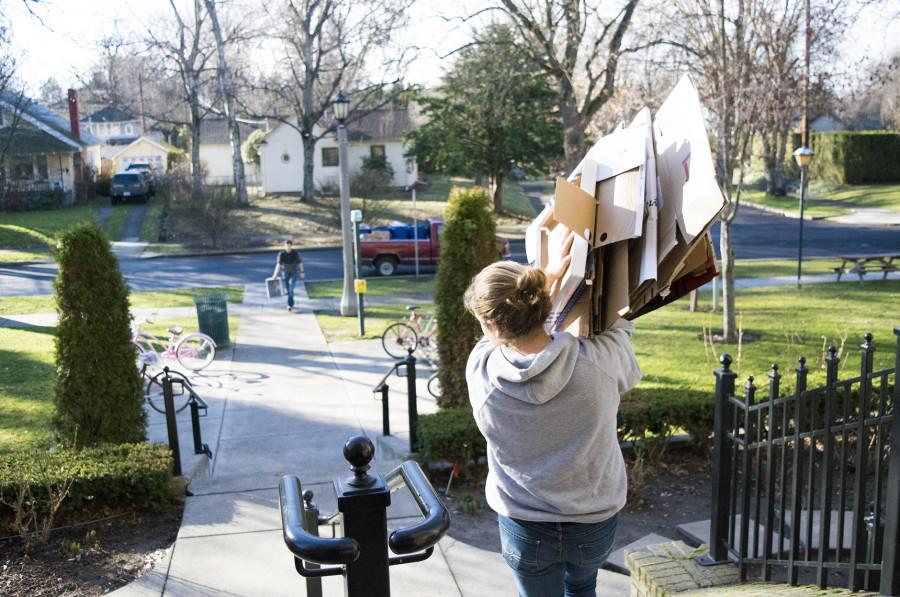Walla Walla’s populated mix of progressive college students, farmers and small town families is also home to a group of unacknowledged individuals: birds.

10 years ago, Walla Walla was dubbed by the city as a “bird sanctuary,” forbidding the hunting and harassment of native bird species within city limits. According to the law, “No person shall shoot or molest any species of wild birds within the city and no person shall molest or damage the nest or eggs of any wild birds within the city.”
While the practicality of the law is debatable, the law is proof of the ecological reverence shared within the community.
“There are lots of reasons why you can’t do too much harm to birds in the city of Walla Walla anyway,” said Professor of Biology and ornithologist Tim Parker. “Bird sanctuaries are enacted a lot of places for symbolic reasons.”

Hunting of native species is illegal on both a federal and state level and the implementation of this law is a reaffirmation of this regulation. Parker also points out that the Federal Migratory Bird Treaty Act of 1918 protects all migratory birds in the United States, Canada and Mexico from unlawful hunting by citizens; a violation of this act could end in fines or jail time. This includes most birds except those introduced from a foreign country, like European birds, or those that are non-migratory, protecting an extent of 800 species of birds. On top of that, the regulation for the management of firearms prohibits hunting in residential areas, so this makes most of the city of Walla Walla off-limits for hunting.
“Hunting is not a problem currently in the United States. We have really good game management laws,” said Parker.
The hunting laws regarding birds protect all but five bird species in the county. Walla Walla has four of the five species in this list, so it is these species that the law attempts to protect. Regardless of the realistic use of this law, it does serve many “symbolic” reasons for the Walla Walla community.
“This law causes people to stop and think,” said Mike Denny, president of the Board of Directors for the Blue Mountain Audubon Society. The Blue Mountain Audubon Society is a local chapter of the national organization, striving to protect the birds and also the general wildlife in Walla Walla. “Birds are really important in this city.”

The amount of ecological services that the roughly 80 migratory, residential and breeding bird species provide for the Walla Walla community often goes overlooked by residents. Birds control the overpopulation of insects, pests, weeds, mice and gophers. Protecting the lives of these birds is in effect enhancing the living quality in Walla Walla.
“If you were to sit down and calculate how much money it would cost you to do the same [ecological] service, it would result in hundreds of thousands if not millions of dollars to do what wildlife would do for us,” said Denny.
However, the introduction of two nonnative species to Walla Walla has resulted in a decline in bird populations: The eastern fox squirrel so common around Whitman College campus was introduced to Walla Walla in 1964, and the increasing number of house cats domestic and feral. The squirrels and cats eat the eggs and destroy the nests of birds, disrupting bird populations.
These birds must also face threats from the suburban lifestyle. They often run into windows or power lines, get hit by cars or are poisoned. These constantly emerging threats force birds to adapt to an increasingly human-centric world and manipulate long-held survival traits.
“Other than a little common sense to protect them, the birds don’t require a whole lot from us,” said Denny.
Another more universal problem for birds is the threats posed by climate change.
“As the temperature across the U.S. has gotten warmer from 1966 to 2005, many bird species are spending their winters farther north,” says the Audubon Society website.
This has caused an increase in the population size as more birds travel to the Northwest, affecting Walla Walla’s community of birds. Despite these threats posed to the birds, there are ways that the community can protect the remaining bird populations. Keeping local house pets inside and creating yards that have adequate covering for birds to hide from predators are some small steps to protecting birds.
The Audubon Society was originally created as an organization to protect birds. It has since grown, reaching 26 Societies in Washington alone. The local Audubon Society was created in 1972, and is an essential part of wildlife protection and preservation in Walla Walla.
“[We] keep tabs of bird populations, make sure that our legislators understand the value of conservation, to make sure the general population at large has an understanding of conservation and the value of keeping clean air and wildlife habitats, and treating this planet with kid gloves because our future depends on that.”
Although the law might fly under many peoples’ radars, it nonetheless protects the growing bird population in Walla Walla. This city’s role as a bird sanctuary is a symbol of the insistence that this community places on environmental awareness and action.














Lyra • Feb 10, 2013 at 8:27 pm
Hooray!